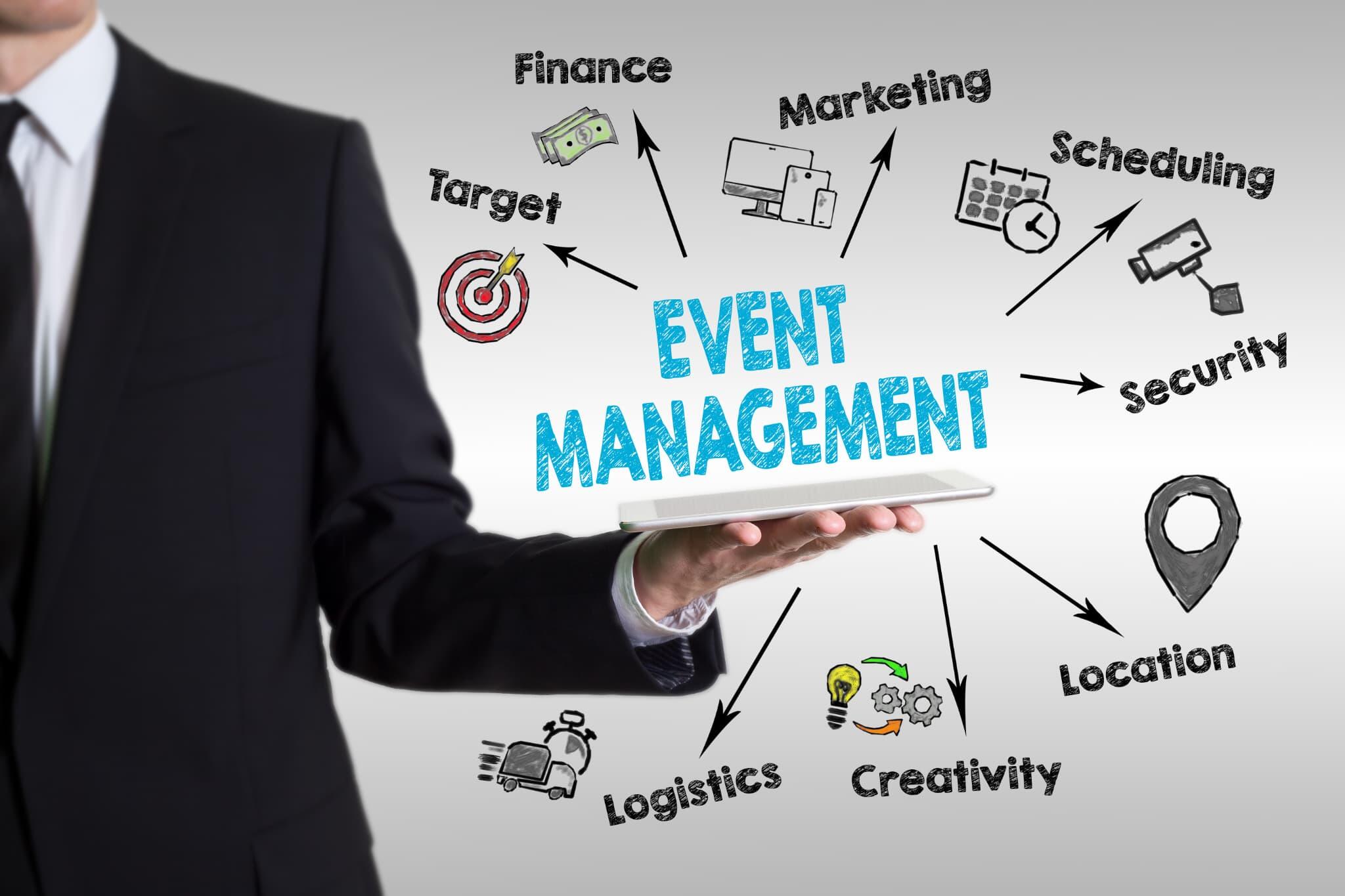Event management refers to planning and managing events for social or business purposes. They could be industry conferences, training seminars, business conventions, trade shows, parties, and so on. From small parties to large-scale events with thousands of attendees, there are many aspects of events that require attention, good organization, and direction to ensure they unfold smoothly and successfully. A successful event connects with the audience, evokes positive emotions, and provides value, whether it's learning, entertainment, or inspiration.
Knowledges
Excellence in Event Management - 8 Tips for Guaranteed Success
2024.10.20
- # Knowledges
- # Event Solution
- # North/South Americas
- # Europe
- # Asia
- # Hawaii
- # Korea
- # China
- # Oceania
- # Micronesia

There may come a time when managing an event falls on your shoulders. Though it may be daunting, preparation and organization are the keys to success. Event management requires a keen sense of attention to detail. With events making a return more than ever since the pandemic subsided, ensuring your event is well-run will help ensure it stands out from the crowd. What makes an event successful? A successful event has many things in common: effective marketing, healthy attendance, discussion about the event on social media, effective planning and smooth execution and more. Learn more below about event management and how to bring an event to life, making it impactful, memorable, and truly successful.
What is Event Management All About?
Is Event Manager the Key to Successful Event Management?

For an event to run smoothly, most organizations will assign one or more people as event managers responsible for managing the whole process - everything from planning and running the event, down to post-event activities. The role can come under different names, for example, Event Coordinator, Meeting Planner, or Head of Events. The variety of titles within the event planning industry reflects the diverse skills and responsibilities required. The title of an event planner can vary depending on the industry, company, or type of events being managed. An event manager plays a crucial role in ensuring the success of events.
It’s a role that requires creativity, organization, problem-solving, and people management. While challenging, it can also be a rewarding experience for the right person suited to the role. The role of an event manager differs from that of an event planner, who mainly works on the pre-planning aspect of organizing an event. While event managers participate in the planning process, they are also on the ground during an event to provide oversight, resolve issues that inevitably arise, reduce potential risks, and be involved in the cleanup afterward. They are responsible for the event’s success as they address any issues in real time and ensure everything runs smoothly, from start to finish.

An event manager has numerous responsibilities that encompass every phase of an event, from initial planning to post-event evaluation. Here is the comprehensive list of Event Manager’s responsibilities:
- Team Building: Creating a team and liaising with sales and marketing teams within your organization.
- Vendor Management: Researching the venue and finding suppliers and contractors to ensure the event is stocked with everything it will need
- Client Support: Providing excellent client service, managing expectations, and addressing any concerns.
- Logistics Management: Managing all operations aspects of the event, from staffing to equipment.
- Safety and Compliance: Responsible for the safety of all participants and ensuring compliance with legal guidelines and local and venue health and safety standards.
- Contingency Planning: Creating contingency plans in case of emergencies and unexpected situations, such as inclement weather or staffing issues.
What is Successful Event Management

The following KPIs are often used to determine how successful an event was. Matching or surpassing your target number of tickets sold and the number of attendees or those checked in would be a clear sign of success. Attendance is not everything, however. Feedback in post-event surveys and on social media paints a picture of how attendees felt about the event.
more positive, the better. Sponsor satisfaction surveys also help provide insight into the opinions of those with a business stake in the event. On the financial side, having an event that covers the costs and makes a profit certainly contributes to the likelihood that the event will happen again. Finally, if the event promoted a product, an increase in sales of that product demonstrates that the event contributed to greater awareness among consumers.
This increased awareness can lead to higher customer engagement and loyalty. By utilizing these KPIs, event managers can comprehensively evaluate the event's performance and its alignment with the initial goals. This analysis not only highlights successes but also identifies areas for improvement, ensuring that future events are even more successful.
8 Event Management Tips
Event management is an opportunity to apply a variety of skill sets and bring out the best in Event managers. While challenging, it is ultimately rewarding and fulfilling. Here are 8 essential tips to master the art of event management...
Research and plan early

Start planning as early as possible. Once you receive the go-ahead to organize the event, make a head start on the research and planning, determining what will be required, and deciding how to approach each obstacle that will come your way.
Assign responsibilities

Managing takes a lot of work - a good team around you makes for the best results. Assign responsibilities to the most suitable members.
Always have a back up plan

Plans may change due to unforeseen circumstances. Create backup plans in case the situation you initially had in mind does not come to fruition.
Stay flexible - plans always require evolution

Having sights set on a particular path to the desired result may not be best for you. From location to the form the event will take, keep an open mind to ensure that the event is the best it can be, no matter the circumstances. By keeping an open mind and remaining flexible in your approach, you’re more likely to uncover unexpected opportunities and achieve success through a variety of paths. This mindset allows for greater resilience, creativity, and growth.
Consider using tech for management the team

Using shared documents, create a manual to share among everyone involved to ensure that information relevant to planning and managing the event is a source of reference. Shared access also allows other members to find flaws within the plans as they stand at any given moment. Shared access creates a collaborative environment where the collective knowledge of the team helps strengthen the plan, reduces the risk of oversights, and ensures a higher likelihood of success.
Using the event management software

Using event data analytics in event management has become vital for driving success by offering valuable insights into attendee behaviour and preferences. JTB Connect stands out as an innovative technology solution for event data analytics, offered by JTB. With its robust features and intuitive interface, JTB Connect empowers organisers to collect, analyse, and act on event data with precision and efficiency. From real-time engagement tracking to post-event performance analysis, JTB Connect provides organisers with the tools they need to unlock the full potential of their events and drive success.
Do a run through beforehand

A run-through before the main event will help you iron out any problems. Get the team together for a mental dress rehearsal from the setting up to the final follow-up. This proactive approach minimizes the likelihood of surprises and allows for a smoother execution on the day of the event. Such rehearsals serve as the perfect opportunity to discover what can be improved and to confirm what works well.
Use the digital platform to your advantage

The internet is great at spreading the word about your event and creating a presence. Design event pages on social media such as Facebook and Twitter and use custom hashtags for people to tag your event before, during, and after the event. Marketing channels like Email allow for personalized communication, nurturing leads, and converting them into event attendees while LinkedIn is a professional platform for reaching a professional audience. By effectively utilizing LinkedIn Ads, you can reach a highly targeted professional audience, generate interest in your event, and drive registrations. Embrace the opportunity to connect with your audience in innovative ways to ensure the overall success of your event
Follow up after the event and analyze

The work does not end upon the conclusion of an event. Take advantage of the momentum from the event by emailing attendees and showcasing the event online through social media and other platforms. These strategies not only enhance attendee satisfaction but also lay the groundwork for future events, turning participants into loyal supporters and advocates for your brand. Post-event analytics can provide invaluable insights into attendee sentiment and preferences. By leveraging data from various sources such as attendee satisfaction surveys, session feedback, and post-event surveys, event organizers can derive actionable insights to optimize future events.
Future Trends Transforming Event Management
Events are constantly evolving with adaptability, innovation, and a focus on attendee experience. By embracing these trends, event planners can create engaging, memorable, and sustainable events that resonate with diverse audiences, ensuring continued success in an evolving landscape. Keeping an eye on these trends will help professionals stay ahead of the curve and meet the changing demands of their clients and attendees.
Environmentally sustainable events

The events industry is working to be more sustainable and to reduce its environmental footprint. Such endeavors include reducing paper waste, eliminating single-use plastics, proposing carbon offset packages, and offering virtual/hybrid event options.
Managing staff shortages
Staff shortages remain a concern even since the pandemic has eased worldwide. However, technology has reduced the need for personnel by replacing administrative work once performed by people, allowing event managers to focus on delivering the best event experience possible. Organizers are now looking into retaining quality staff with improved benefits packages and career opportunities to avoid staff shortages.
Changing consumer expectations and technology
The rise of digital technologies in our daily lives has also led event venues to adapt, such as through e-tickets, contactless payments, and “in-app” mobile purchases.By thoughtfully integrating modern tools into the event management process, planners can create engaging, efficient, and sustainable events that meet the needs and expectations of today’s audiences.
AR/VR and live streaming

With virtual and hybrid event setups growing over the past few years, don’t be surprised to see more AR/VR technology utilized to bring greater interactivity for attendees. The growth in live streaming allows people who cannot physically attend an event to nevertheless become part of it. Event planners can create immersive, engaging experiences that resonate with attendees and set their events apart in an increasingly competitive landscape by continuously innovating and leveraging technology.
Generating new revenue streams
Drops in revenue during the pandemic have led some venues and higher educational facilities to repurpose their spaces by turning them into bookable rooms available to the public. The greater availability of unique spaces can help with creating new ideas and experiences for your next big event. By diversifying your revenue streams and thinking creatively, you can enhance the financial sustainability of your event management business.
Summary

Event management is a job that requires a diverse set of skills but can be a rewarding experience. The success or failure of the event hinges on the efforts of the people responsible for its management. Their ability to anticipate challenges, adapt to changing circumstances, and deliver a seamless experience can significantly impact attendees' satisfaction and the overall outcome of the event.
The journey of planning and executing an event cultivates a sense of community and shared responsibility, driving everyone involved to strive for excellence and leave a lasting legacy through their work. From event planning to management, you can count on JTB's experienced team to help you plan and manage your event. Contact JTB for more information and discover how we can assist you in creating a successful event that meets your objectives and exceeds expectations.t. Please feel free to contact us.
Knowledges
View More





